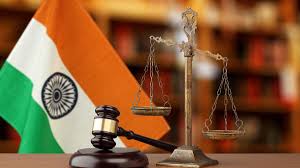Judicial Push Amid Legislative Inaction on Social Issues
Social Issues Social Inequalities and exclusionPosted by NewAdmin on 2025-04-07 08:59:58 |
Share: Facebook | Twitter | Whatsapp | Linkedin Visits: 69

The Supreme Court’s decision to refer the issue of same-sex marriage recognition to a Constitution Bench marks a significant moment for gender equality in India. This move, while seen by some as judicial overreach, responds to the prolonged inaction of the legislature on a crucial social issue. Petitioners argue that granting legal recognition to same-sex marriages is a logical progression from the Court’s 2018 verdict that decriminalised homosexuality.
The government, on the other hand, holds that the traditional, heterosexual definition of marriage should be preserved and that any shift in this understanding must come through Parliament, not the judiciary. The Court is now tasked with interpreting whether the Special Marriage Act, 1954, which allows marriage between “any two persons,” can be extended to include same-sex couples. While the government claims the decriminalisation of homosexuality removed social stigma, it insists that this does not translate into the legal right to marry.
From an equality standpoint, denying same-sex couples the rights enjoyed by heterosexual married couples creates a clear disparity. Concerns about inheritance, property, or adoption laws can be addressed through legal reforms. The government’s argument that such marriages would offend religious or cultural sensibilities is weak—marriage is not just a sacred tradition but also a social and legal institution, and its benefits should be universally accessible.
Ultimately, whether same-sex marriage is recognised through a court verdict or legislation remains a crucial debate. While legislative involvement in reforming personal laws is desirable, prolonged government inaction creates space for judicial intervention. If the state fails to act on pressing social issues, the judiciary is not only justified but compelled to step in and uphold fundamental rights.
Search
Categories
Recent News
- MS Dhoni's Vision for India's Future: The Longevity of Rohit and Kohli
- Pawan Kalyan's Telangana Campaign: A Political Strategy
- Hyderabad's Pedestrian Revolution: A City Reclaims its Footpaths
- Hyderabad's Traffic Vigilantes: Citizens Take Charge
- Billionaire's Pledge: 75% Wealth to Charity
- Unveiling Nagawara's Historic Roots: A Village's Story
- Indian Man's Mid-Air Assault: A Disturbing Incident
- MS Dhoni's Commentary Conundrum: Why the Legend Avoids the Mic